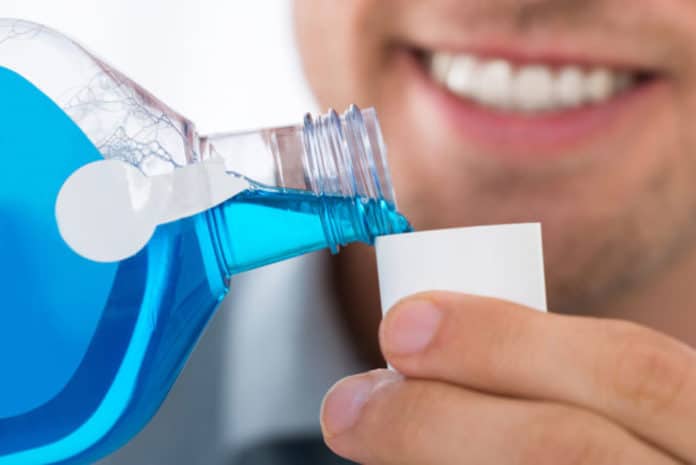SARS-CoV-2 is an enveloped virus, characterized by an outer lipid membrane derived from the host cell from which it buds.
While it is highly sensitive to agents that disrupt lipid bio-membranes, there has been no discussion about the potential role of oral rinsing in preventing transmission.
In a new study by the Cardiff University’s School of Medicine in collaboration with universities of Nottingham, Colorado, Ottawa, Barcelona, and Cambridge’s Babraham Institute, scientists reviewed known mechanisms of viral lipid membrane disruption by widely available dental mouthwash.
Past studies have suggested that the components in mouthwash, such as ethanol, chlorhexidine, cetylpyridinium chloride, hydrogen peroxide and povidone-iodine, could disrupt the lipid membranes of several enveloped viruses. But, it was not clear that this could also be the case for this new coronavirus.
For the study, scientists assess mouthwash formulations for their potential ability to disrupt the SARS-CoV-2 lipid envelope. They found that the mouthwash could be effective in reducing SARS-CoV-2 transmission.
What’s more, the study also highlights several deserve clinical evaluation of mouthwash.
Scientists noted, “We highlight that already published research on other enveloped viruses, including coronaviruses, directly supports the idea that further research is needed on whether oral rinsing could be considered as a potential way to reduce transmission of SARS-CoV-2.”
“To determine the potential of this approach could include evaluating existing – or specifically-tailored – formulations of mouthwash in the lab and then in clinical trials. Monitored population-based trials could be undertaken with appropriate commercially-available brands.”
Lead author Professor O’Donnell, Co-Director of Cardiff University’s Systems Immunity Research Institute, said: “Safe use of mouthwash – as in gargling – has so far not been considered by public health bodies in the UK. In test-tube experiments and limited clinical studies, some mouthwashes contain enough of known virucidal ingredients to target lipids in similar enveloped viruses effectively.”
“What we don’t know yet is whether existing mouthwashes are active against the lipid membrane of SARS-CoV-2. Our review of the literature suggests that research is needed as a matter of urgency to determine its potential for use against this new virus.”
“This is an under-researched area of major clinical need – and we hope that research projects will be quickly mobilized to evaluate this further.”
Professor O’Donnell added: “Mouthwash has not been tested against this new coronavirus yet. People should continue to follow the preventive measures issued by the UK government, including washing hands frequently and maintaining social distance. This study suggests further clinical studies could be worthwhile based on the theoretical evidence.”
Journal Reference:
- Valerie B O’Donnell, Potential role of oral rinses targeting the viral lipid envelope in SARS-CoV-2 infection. DOI: 10.1093/function/zqaa002
